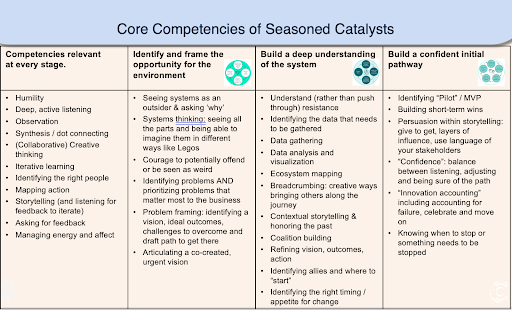September CLT Monthly Meeting Summary - "Seasoned Catalysts’ Journey to Making an Impact"
A few themes from this discussion:
Identifying and Framing the Opportunity
The process begins by developing a deep understanding of the opportunity and the systems in which the business operates. This requires "conversation and conversation and conversation" to frame the business case and determine the best path to ‘green light” the project.
Building Understanding and Gathering Data
The need for data gathering is central to this phase as there's probably an information gap to build the case or to make a decision. This data may be qualitative or quantitative, and it involves identifying key players in the internal and external ecosystem, such as competitors or potential collaborators. The members emphasized the importance of coalition building here and throughout the process.
As information flows in, synthesis is crucial.
Synthesizing Information and Crafting Solutions
Once sufficient data is collected and synthesized, the conversation shifts toward crafting a preliminary solution or pathway. This involves storytelling, risk management, and stakeholder alignment: "There's contextual storytelling that you're doing to bring people along, based on what you've learned, what the moment is."
The pathway is not final but represents a confident initial direction. This is followed by piloting a solution, a minimal viable product (MVP), or gaining small wins within the organization.
Iterative Learning and Leadership Competencies
We don't necessarily go back to identifying the problem but iterate, reframe, gather more data, and continue moving things forward.
Tracey then walked us through the underlying competencies displayed by seasoned Catalysts throughout this journey.
Finally, to use as a coaching tool for earlier-in-career catalysts, we discussed the key skills displayed by seasoned catalysts, which do not show up as frequently for less experienced catalyst leaders.
The following member quotes from chat and discussion give you a flavor of the subsequent member exchanges:
Catalytic Leadership
Empowering Others: "Catalysts as enablers of others’ success" and "To be a great leader in today’s world, I believe you have to create and give ownership and space for others."
Humility and Leadership: "Humility plays a critical role in successful leadership and innovation," and "It’s how we enable others to step into the space we create."
Organizational Speed Limits: "There are organizational speed limits for moving change forward."
Innovation & Experimentation
Experimentation Mindset: "Innovation is not about fixing and improving ideas, but is actually about running experiments that gather data to help decision-making."
Making Innovation Stick: "Balancing optimism and skepticism," and "Getting legal/risk people involved in the process early enough so they have a vested interest."
Challenges for Catalysts
Handling Resistance: "I know we may have to push through criticism and stay true to the idea."
Junior vs. Mature Catalysts: "Junior catalysts tend to get stuck on a good idea, and seasoned catalysts can anticipate resistance."
Pontificators vs. Doers: "People who talk big but don’t do the work of innovation are frustrating."
Personal Development for Catalysts
Equanimity & Meditation: "Maintaining equanimity is a personal skill that helps to lead effectively," and "I believe meditation has helped me stay balanced."
Self-Assessment Tools: "Tools for assessing how well catalysts nurture others, focus on experimentation, and achieve balance are valuable."
Building Coalitions & Collaboration
Including Stakeholders: "Include legal, risk, and other critical stakeholders earlier in the process to avoid transactional relationships."
Coalition Building: "Building a coalition and empowering others in the process is critical for catalyzing change."
Culture & Subordinates
Subordinates Seeking Credit: "Sometimes, subordinates are focused on their own recognition rather than team success."
Personal Contributions & Superpowers
Listening & Synthesizing: "My superpower is to 'listen/see' diverse perspectives and distill them into a unified observation/vision that everyone can align with."
Systemizing: "My superpower is systemizing."
Reflection & Energy Management
Reflection on Framework: "Reflect on the framework of today and take my personal baseline for these"
Managing Energy: "Be more mindful of managing my energy and affect."
Leveraging Change: "I am going to continue to look at the model and think about how I might leverage it with my leadership team that is about to go through massive change."




